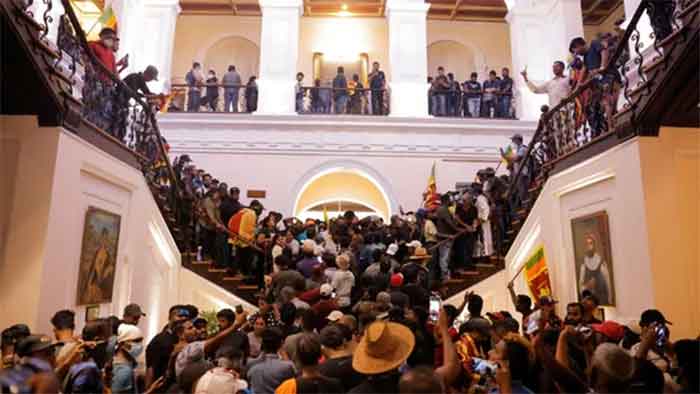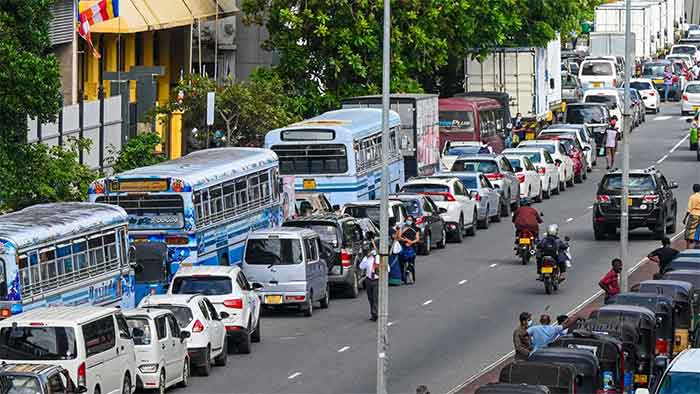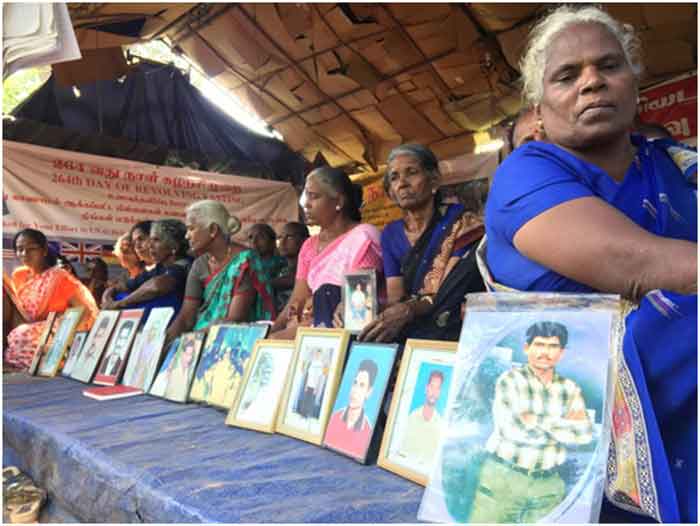
Sri Lanka’s opposition parties are trying to cobble together an all-party government and pick candidates who can take over after President Gotabaya Rajapaksa and Prime Minister Ranil Wickremesinghe agreed to step down, giving in to popular pressure in a country struggling to pay for essentials.
Sri Lanka has been plunged into a political vacuum after an economic crisis sparked widespread protests against the government.
Media reports said:
A group of nine Cabinet ministers announced they will quit immediately to make way for an all-party government, outgoing Justice Minister Wijayadasa Rajapakshe said. Wickremesinghe’s office said that another group that met the prime minister decided to stay on until a new government is formed.
Opposition party leaders have been in discussion to form an alternative unity government, an urgent requirement of a bankrupt nation to continue discussions with the International Monetary Fund for a bailout program.
Opposition parties are also concerned over military leaders making statements about public security in the absence of a civil administration.
Lawmakers have discussed Chief of Defense Staff Gen. Shavendra Silva’s statement over the weekend calling on people’s cooperation to maintain law and order, said Kavinda Makalanda, spokesperson for Premadasa.
“A civil administration is the need, not the military in a democratic country,” Makalanda said.
If opposition parties fail to form a government by the time Rajapaksa resigns, Wickremesinghe as prime minister will become acting president under the constitution. However, in line with the protesters’ demand, opposition parties are keen on not allowing him take over even as acting president.
They say Wickremesinghe should promptly resign and allow Speaker Mahinda Yapa Abeywardena take over as acting president — the next in line according to the constitution.
Rajapaksa will step down on Wednesday to allow for a smooth transfer of power, the parliament speaker announced on television late Saturday.
U.S. Secretary of State Antony Blinken said the U.S. was closely watching the developments and urged the government to address popular discontent.
Army Denies Firing At Protesters
The army said it only fired rounds into the air and into sidewalls to prevent angry protesters from breaching the security of the president’s compound.
“The Army categorically denies having opened fire towards the protesters,” a media statement said. “Firing into the air and sidewalls do not therefore necessarily mean that those Army personnel on duty were intent on causing deliberate harm to the protesters.”
The army’s statement follows comments on social media that troops fired live rounds at the crowds.
Fuel
Sri Lanka’s fuel distribution is limited mostly to Lanka Indian Oil Corp as stocks held by the state-run Ceylon Petroleum Corp remains depleted, according to the Energy Ministry spokesman.
A delivery of diesel from supplier Coral Energy, that was expected by July 9 has been delayed. A shipment from Vitol is due between July 11-14, while supplies of petrol from the IOC are expected to reach by July 22-23.
Coral Energy is scheduled to deliver crude oil consignments on July 15 and Aug 12, the government spokesman said, without giving details of volumes.
Fresh Gas Shipments Arrive
A ship carrying 3,700 metric tons of LPG has reached Sri Lanka Sunday, a statement from the president’s office said, adding that two more ships with the cooking gas will arrive over the next few days.
“President Gotabaya Rajapaksa has instructed the officers to carry out the unloading and distribution of LPG as soon as the first ship arrives,” the statement added.
The fresh supplies will ease the domestic cooking gas crunch by the end of the month, the president’s office said, citing the main national gas supplier, Litro Gas Company.
Rajapaksa Ally Resigns As Minister of Investment Promotion
Sri Lankan tycoon Kulappuarachchige Don Dhammika Perera, one of the country’s richest men and a close ally of the Rajapaksa family, resigned as the minister of investment promotion, local media reported.
IMF To Continue Technical Discussions
The IMF plans to continue technical discussions with counterparts in the finance and central bank, saying it was “deeply concerned about the impact of the ongoing economic crisis on the people, particularly the poor and vulnerable groups.”
The fund hopes for a resolution of the current situation that will allow for a resumption of discussions for an IMF-supported program, the officials said in a statement.
Protesters Celebrate
Protesters were celebrating into the night after hearing the news that Rajapaksa would step down as president.
Protesters Enter PM’s Official Residence
Protesters entered the official residence of the prime minister in Colombo, waving national flags, according to video footage on social media.
A smaller group also protested near Wickremesinghe’s private residence despite security officials firing tear gas, local media reported.
Political Vacuum As Talks Go On Amid Crisis
An AP report said:
Sri Lanka was in a political vacuum for a second day Monday with opposition leaders yet to agree on who should replace its roundly rejected leaders, whose residences are occupied by protesters angry over the country’s deep economic woes.
Protesters remained in President Gotabaya Rajapaksa’s residence, his seaside office and the prime minister’s official home, which they stormed on Saturday demanding the two leaders step down.
The president has not been seen or heard publicly since Saturday and his location is unknown. But his office said Sunday that he ordered the immediate distribution of a cooking gas consignment to the public, suggesting that he was still at work.
Lawmaker Udaya Gammanpila said the main opposition United People’s Front and lawmakers who have defected Rajapaksa’s ruling coalition have had discussions and agreed to work together. Main opposition leader Sajith Premadasa and Dullas Alahapperuma, who was a minister under Rajapaksa, have been proposed to take over as president and prime minister and have been asked to decide on how to share the positions before a meeting with the parliamentary speaker later Monday.
Sri Lanka is relying on aid from India and other nations as leaders try to negotiate a bailout with the IMF.
Protestors Find, Then Return, Millions Of Rupees In Cash
Sri Lankans who engaged in a mass protest at the Fort area took steps to inform the Central Colombo Police of a sum over Rs. 17 million being found, after which a group of Police officers attached to Fort Police station took steps to accept the funds.
Accordingly, a sum of Rs. 17,850,000/- was handed over to the Police, after a group of protestors discovered the money at the President’s House, and informed a Special Task Force member at the premises.
Central Bank Gives Rs.107bn In Printed Money To Finance Fuel Imports
After the Central Bank last week disclosed that it had received a request from the General Treasury to provide liquidity to the value of Rs.217 billion to finance fuel imports by Ceylon Petroleum Corporation (CPC), the data showed that the Central Bank had issued Rs.107 billion to CPC, on Friday.
In a special issuance of Treasury bills to the Central Bank, the government had borrowed the said amount as CPC is still undergoing an acute rupee liquidity crunch, on top of the dollar crunch, even after it raised the prices of the petroleum products to sky-high levels in multiple times, through what has now turned out to be a controversial pricing formula.
Central Bank Governor Dr. Nandalal Weerasinghe, disclosing the dilemma they are facing between taming skyrocketing consumer prices and providing financing to the government’s urgent financing needs, said monetary financing or money printing is not something they like doing.
However, he said unlike in 2020 and 2021, where a colossal amount of money was printed to buy dollars from the Central Bank to settle foreign loans and also to make up for the other funding shortages of the government, today money printing happens with much restraint.
Until September last year, the Treasury bill auctions saw only a fraction of being subscribed by the market, due to the yield controls and hence the balance had to be bought by the Central Bank through printed money, which also added to the exponential monetary expansion.
However, now the monetary financing happens only when the government runs out of money to pay salaries, pensions and to provide funding to public utilities such CPC and the Ceylon Electricity Board to ensure fuel and electricity supplies.
Dr. Weerasinghe said even in the week before last, the Central Bank provided the Treasury with Rs.18.5 billion through a special bill auction for the same purpose.
Despite the intentions by the Central Bank to shrink it over Rs.2.2 trillion balance sheet, the lack of revenues generated by the government in meeting its expenditure appeared to be delaying it.
The total stock of government securities held by the Central Bank topped Rs.2.23 trillion as of last Friday, after surpassing the Rs.2.0 trillion levels on June 17.
Protesters remained in President Gotabaya Rajapaksa’s residence, his seaside office and the prime minister’s official home, which they took possession of on Saturday. It was the biggest and most eventful day of protests over the past three months surrounding the administrative district in the capital, Colombo.
Sri Lanka announced in April that it was suspending repayment of foreign loans due to a foreign currency shortage. Its total foreign debt amounts to $51 billion, of which it must repay $28 billion by the end of 2027.
Months of demonstrations have all but dismantled the Rajapaksa political dynasty, which has ruled Sri Lanka for most of the past two decades but is accused by protesters of mismanagement and corruption.
There are reports that the Speaker Mahinda Abeywardana will take charge as the acting president after Gotabaya leaves office on July 13, paving way for an all-party government. Once the political situation is under control, the interim government will call for general elections to elect a new Parliament, according to a report in Hindustan Times.
A report by Sri Lankan news outlet Daily Mirror LK citing people familiar with the developments said that presidential and parliamentary elections will be held before March next year.
The appointment of Abeywardana will be temporary lasting for a period of 30 days during which parliament will select a new president.
Wickremesinghe will hold a meeting on Monday evening to discuss fuel shipments and foreign delegations which are due to arrive in the country this week.
Opposition leader Sajith Premadasa also said that if he is elected president he will appoint Dullas Allahapperuma as prime minister.
The opposition parties Samagi Jana Balawegaya (SJB) and Sri Lanka Freedom Party (SLFP) have made it clear that neither the Rajapaksas nor Wickremesinghe should return to power.
India and several other nations have extended their full support to Sri Lanka and quashed claims that they will send troops to help restore normalcy.
Army
The Sri Lankan army refuted reports on social media that there will be a crack down on protesters and said that protesters can continue to protest peacefully without breaking the law.















































